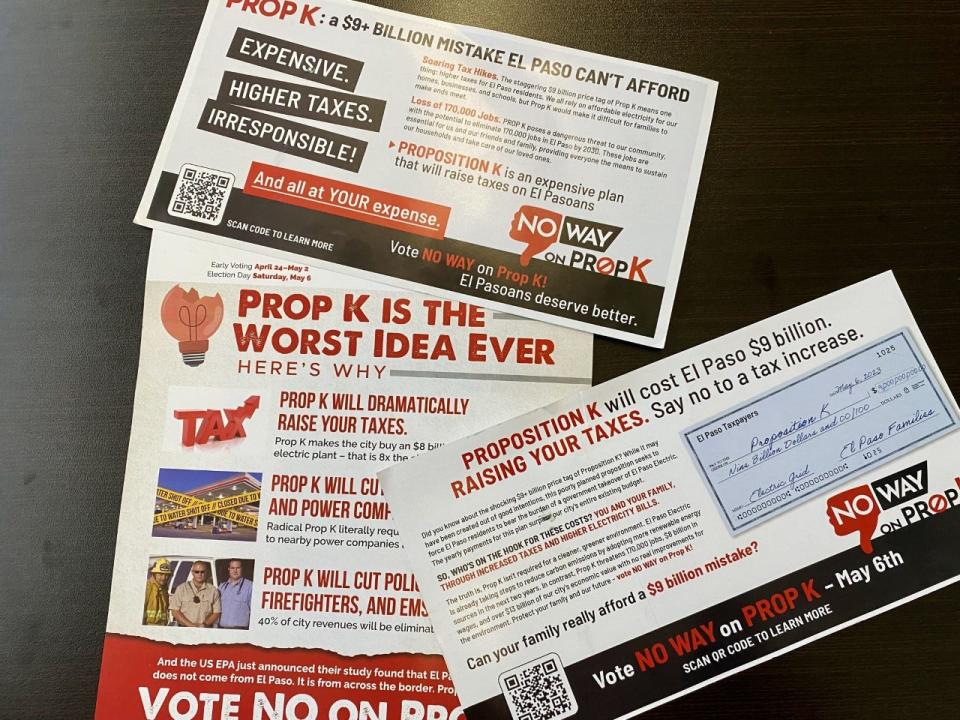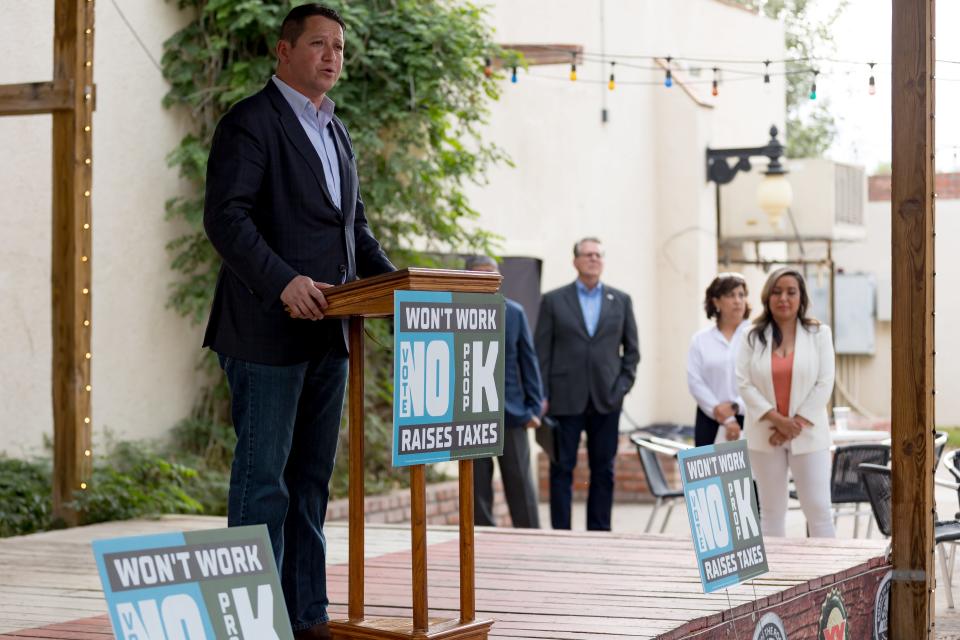El Paso climate charter backers, opponents reflect on Prop K defeat
As the dust settles on the debate over the proposed El Paso Climate Charter, the ambitious youth-led initiative to codify the city's commitment to fighting climate change, opponents of the proposal are taking a victory lap while advocates are left wondering what went wrong.
Voters roundly rejected the Proposition K at the ballot box - more than 28,000 of the 33,439 voters who cast ballots early voted against the measure and the trend continued on Election Day, where the final tally saw 82% of voters reject the item.
Read More: El Paso voters reject Climate Charter proposal by wide margin
Despite more than 36,000 petition signatures to add the proposal to the May 6 ballot, only 9,190 voters cast ballots in favor of the climate charter.
The El Paso Chamber led the charge in opposing the charter proposition, establishing the El Pasoans for Prosperity PAC which was fueled in large part by hundreds of thousands of dollars in donations from El Paso Electric and Marathon Petroleum, two of the main companies targeted by climate charter proponents.
For Chamber President Andrea Hutchins, the climate proposal's defeat is a win for local businesses and taxpayers, but it does not undermine the need to address climate change in a more reasonable way.
"The El Paso Chamber has been the focal point for many in support of Prop K," Hutchins said in an email. "Despite the rhetoric, the El Paso Chamber believes efforts to combat climate change are important and should be enacted so long as affordability and reliability are at the heart of those decisions. Prop K was neither of those things."
Prop K would have required the city to conduct a study to explore the feasibility of transitioning El Paso Electric to municipal ownership, ban water sales to fossil fuel businesses outside of the city and transition city buildings to solar energy. Opponents claimed the proposition would be too costly and would damage El Paso's economy.
The climate charter proposal was championed locally by environmental activist group Sunrise El Paso, which was supported by the Austin-based Ground Game Texas - for Hutchins, the outside group's involvement may have been the death knell for the local proposition, just as it was in other Texas cities.
Ground Game Texas spearheaded the push for San Antonio's Proposition A, a proposal that would have decriminalized abortion and low-level marijuana offenses and established a cite-and-release policy for Class C misdemeanors such as petty shoplifting and vandalism, which was rejected by more than 70% of voters Saturday night.
"(W)hile the folks on the ground believed this initiative was climate focused, I have to question whether the authors (Ground Game Texas and its political director, Mike Siegel) didn’t have another agenda in mind," Hutchins said in the email. "I don’t think I’m alone. I think El Pasoans saw right through their motives – much like the people of San Antonio did last night when they handily defeated Prop A (authored by the same individuals)."
"I am hopeful last night’s crushing defeat in two major Texas cities sent a message to Ground Game Texas that our communities are not as easily swindled as they had hoped," she continued. "Unfortunately, I suspect we have not seen the last of Mike Siegel and his group. His firm generally profits whether these initiatives win or lose."
But while the El Paso business community seemed united in its opposition to Proposition K, bolstered by both the Chamber and the El Paso Hispanic Chamber of Commerce, Hutchins said it was more than just business owners who outright rejected the proposal.
The workforce of El Paso Electric represented by the International Brotherhood of Electrical Workers (IBEW) 960 also opposed the measure.
"We have heard a lot of talk about the business community defeating Prop K, but we seem to forget that at the heart of businesses are people – and those people are our members," Hutchins said in the email.
"Opposition to Prop K came easily for the Chamber because it would hurt the people behind business – who pay bills and put kids through school with the earnings of their jobs," Hutchins said. "Prop K was asking for El Pasoans to write a blank check with the promise that one day, some day, they will know what they paid for. That’s not how businesses work."
El Paso's Prop K advocates head back to the drawing board
A big part of the climate charter strategy, mapped out and traversed by Sunrise El Paso and Ground Game Texas, was to use the charter amendment process to enact sweeping changes that might otherwise be incremental, if at all.
While Siegel conceded that the strategy failed, he noted that a number of forces were at work to ensure that it did, including millions in opposition spending, city bureaucracy which stalled the climate charter campaign from the beginning and an election in which more than half of voters were over 50.
"It wasn't that the city of El Paso rejected it," Siegel said, "it was that a small sliver of the electorate rejected it. We don't take this as any sort of symbol that the community doesn't want to take action on the climate."
Where pushing the issue forward through the charter amendment process is concerned, Siegel admitted that it was a "rare tactic" and the immense nature of the proposal provided opponents with a variety of ways to attack the initiative.
"I do think that the diverse array of programs in the climate charter gave the opposition different angles to attack it," Siegel said. "When you have a broader proposal, it gives opponents more opportunity to find fault."
Perhaps more damning was the amount of money spent fighting Proposition K ‒ Siegel noted that the opposition's "record-breaking" spending amounted to about $75 per vote.
"For an election with a little under 45,000 votes, and they spent $2 million, that's unheard of," Siegel said. "That shows how threatened they are by this kind of policy. I think it shows that the organizers in El Paso are onto something - they struck terror in the hearts of these multi-million dollar corporations with these fairly modest proposals."
But the final straw for the climate charter campaign, Siegel said, might have been the city's efforts to slow the process by delaying the verification of petition signatures and keeping the proposal off the November ballot, which saw young, progressive El Pasoans rush to the polls in support of Beto O'Rourke's bid for governor.
More: Climate charter question faces tight timeline to get on November ballot
"The delay by the city really hurt the momentum of the campaign," Siegel said, noting that organizers began collecting signatures last Spring and submitted their petition by mid-Summer only to have to wait nearly a year to see their proposal go before voters. "I think it's well documented that the city manager and various other city personnel opposed the climate charter at every step of the process."
Still, Siegel is optimistic that the climate charter campaign has succeeded in preparing the next generation of El Paso leaders to take their seats in the halls of power.
"We lost the battle, but we haven't lost the war," he said. "I really do see this as more a beginning than an end."
For his part, Siegel is hoping the El Paso City Council, which saw some members praising the initiative, will take up parts of the proposal and vote them into law.
"Now is a good time to push forward one or more aspects of this charter," Siegel said. "The city council could take action and, hopefully, in the next municipal election, this will become an issue people are talking about."
Big spending, prominent supporters pushed opposition campaign over the finish line
While the El Paso Chamber was by far the most vocal opponent of the climate charter, the opposition campaign had big support from outside organizations and area politicians which stood to amplify its message far louder than advocates could keep up with.

The Houston-based Consumer Energy Alliance (CEA), which filled mailboxes with anti-Proposition K mailers for weeks, spent more than half a million dollars fighting the local initiative, undermining any moral high ground the opposition might have thought it had over the outside group taking sides with El Paso climate activists.
“Consumer Energy Alliance thanks the voters of El Paso for their strong participation in this critical election," CEA Southwest Executive Director Matthew Gonzalez said in a statement released as early voting results rolled in. "The results show that a vast majority of El Pasoans believe Proposition K was the wrong path to move the city towards a clean energy future."
“Voters have rejected the higher energy bills and tax increases that would’ve been foisted on El Pasoans by Prop K," he continued. "El Paso’s citizens and small businesses need reliable, affordable energy, and today they came out inforce to defend that principle and the city’s quality of life by saying 'No Way on Prop K.'”
Meanwhile, El Paso Electric, which contributed $200,000 to the Chamber's PAC, issued a statement thanking voters and vowing to do its part to fight climate change in the borderland.
"We want to thank the voters who cast their ballot in this election that was so important to the people of El Paso," said El Paso Electric President Kelly Tomblin in a Sunday morning statement. "We appreciate the confidence that you have demonstrated in our plan to deliver carbon-free resources to our community. For more than 120 years, we have been the proud energy provider in our service region where we now serve 460,000 families from Hatch, New Mexico to Van Horn, Texas. We remain focused on delivering on our commitment of 80% carbon-free energy by 2035 and 100% by 2045. We look forward to growing our partnerships with our customers and the communities we serve to ensure all El Paso Electric customers receive the reliable, affordable and sustainable power they deserve.”
But it wasn't just the fossil-fuel industry and its surrogates that loudly proclaimed their opposition to climate charter - the anti-Proposition K campaign had a vocal supporter in U.S. Rep. Tony Gonzales, who attended multiple events to condemn the proposal.

“Today— El Paso rejected an extreme ballot initiative which would have codified the Green New Deal," Gonzales said in a news release Saturday night. "This result is a victory for blue-collar workers, small businesses, and everyday taxpayers."
"One thing that is clear from tonight’s election results is that El Paso will not allow out-of-town interest groups to dictate local policy at the expense of the people who live and work here,” he added.
This article originally appeared on El Paso Times: El Paso climate charter backers, opponents reflect on Prop K defeat

